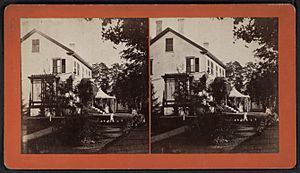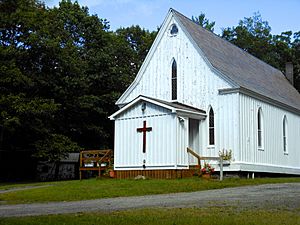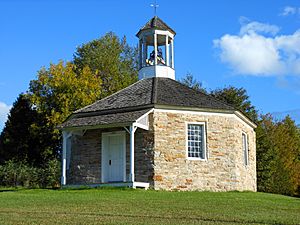Essex, New York facts for kids
Quick facts for kids
Essex, New York
|
|
|---|---|
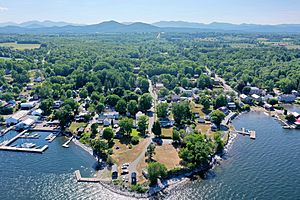
Essex, New York, as seen from above Lake Champlain and off Begg's Point
|
|
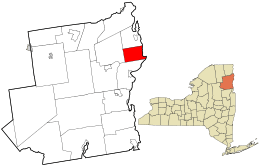
Location in Essex County and the state of New York
|
|
| Country | United States |
| State | New York |
| County | Essex |
| Government | |
| • Type | Town Council |
| Area | |
| • Total | 37.60 sq mi (97.38 km2) |
| • Land | 31.63 sq mi (81.92 km2) |
| • Water | 5.97 sq mi (15.46 km2) |
| Elevation | 266 ft (81 m) |
| Population
(2020)
|
|
| • Total | 621 |
| • Estimate
(2016)
|
642 |
| • Density | 20.30/sq mi (7.84/km2) |
| Time zone | UTC-5 (Eastern (EST)) |
| • Summer (DST) | UTC-4 (EDT) |
| ZIP code |
12936
|
| Area code(s) | 518 |
| FIPS code | 36-031-24768 |
| GNIS feature ID | 0978946 |
Essex is a small town in Essex County, New York. It sits right next to Lake Champlain. In 2020, about 621 people lived there. The town gets its name from places in England.
Essex is on the eastern side of Essex County. It's about 17 miles (27 km) south of Burlington, Vermont, which is across Lake Champlain. It's also 32 miles (51 km) south of Plattsburgh and 135 miles (217 km) north of Albany. Essex is located inside the beautiful Adirondack Park.
Contents
A Look at Essex's Past
Around the year 1530, when Europeans first arrived, the western shores of Lake Champlain were home to the Mohawk people. They were part of the Iroquois group, and they often met with the Abenaki people, who were Algonquian.
Essex was once part of a large land gift given by King Louis XV of France to Louis Joseph Robart. However, this land was lost after the British took control of the area in 1763.
The first settlers came to the region around 1765. They wanted to create a large estate, similar to those along the lower Hudson River. This idea came from a landowner and investor named William Gilliland.
The town of Essex was officially formed in 1805. It was created from a part of the town of Willsboro. Essex was an important place for building ships and had a busy port. But this changed after 1849 when railroad lines started to appear in the region. The new railroads made it easier to move goods, and the town's shipping business slowed down.
Some important historic places in Essex are listed on the National Register of Historic Places. These include the Essex Village Historic District, the Foothills Baptist Church, and the Octagonal Schoolhouse.
Essex's Location and Landscape
The United States Census Bureau says that the town of Essex covers a total area of about 37.6 square miles (97.4 square kilometers). Most of this, about 31.6 square miles (81.9 square kilometers), is land. The rest, about 5.97 square miles (15.5 square kilometers), is water.
The eastern edge of Essex is the state line with Vermont. This line runs right through the middle of Lake Champlain.
New York State Route 22 is a main road that runs north and south through Essex.
Who Lives in Essex?
The population of Essex has changed over the years:
- 1820: 1,223 people
- 1830: 1,543 people
- 1840: 1,681 people
- 1850: 2,351 people
- 1860: 1,633 people
- 1870: 1,600 people
- 1880: 1,462 people
- 1890: 1,437 people
- 1900: 1,333 people
- 1910: 1,276 people
- 1920: 1,025 people
- 1930: 1,116 people
- 1940: 1,002 people
- 1950: 1,012 people
- 1960: 880 people
- 1970: 837 people
- 1980: 880 people
- 1990: 687 people
- 2000: 713 people
- 2010: 671 people
- 2020: 621 people
In 2000, there were 713 people living in Essex. About 24% of the households had children under 18. The average age of people in town was 45 years old.
Learning and Fun in Essex
Most students in Essex go to the Willsboro Central School District. Some also attend Boquet Valley Central School. A few students travel across Lake Champlain to Vermont or go north to Plattsburgh for private schools.
The Essex Theatre Company has been putting on plays and musicals for over twenty years. They perform in the Masonic Lodge, near the ferry dock, mainly in the summer.
Essex is known for its charming shops, cafes, and restaurants. The entire town is actually listed on the National Register of Historic Places because of its many historic buildings.
The Whallonsburgh Grange also offers adult education programs, like history lectures.
Things to Do in Essex
Essex offers many fun activities all year round.
Cycling and Hiking Adventures
- Cycling: Biking is very popular here. Roads like Whallons Bay Road offer amazing views of Vermont and the Adirondack High Peaks. Walker Road is another favorite route for local riders.
- Empire State Trail: Route 22 is part of the Empire State Trail, which opened in 2020.
- Hiking: The Champlain Area Trails (CATS) offer dozens of miles of trails through small mountains, forests, and fields.
- Essex Quarry Trail: At the top of Bull Run, this new trail lets you explore the remains of an old quarry in a unique forest setting.
- Walking: Quiet side roads throughout the town are perfect for peaceful walks.
Water Activities and Fishing
- Lake Fun: On Lake Champlain, people love sailing, swimming, stand-up paddleboarding (SUPs), and kayaking in the summer.
- Fishing: Both Lake Champlain and the Boquet River have great spots for fishing for all ages.
Getting Around Essex
Air and Ferry Travel
- Airports: For air travel, you can use Plattsburgh International Airport, about 30 miles (48 km) north. Or, you can take the ferry across the lake to Burlington International Airport in Vermont.
- Ferry Service: The Lake Champlain Transportation Company runs a ferry between Essex and Charlotte, Vermont. This ferry has been running all year since 1998. Many people use it for medical care, jobs, school, and shopping. The first ferry service in Essex started around 1790.
Train Service
Medical Care in Essex
Essex is in a rural part of the Adirondack Park. Many residents use the Lake Champlain ferry to get to medical care.
- Local Hospital: The closest emergency room is at Elizabethtown Community Hospital, about a 17-mile (27 km) drive away. It's a smaller hospital.
- Larger Hospitals: For more services, you can take a 20-minute ferry ride and then drive to Fletcher Allen Hospital in Vermont. Another important hospital with a full emergency department is CVPH Medical Center in Plattsburgh, about 35 miles (56 km) north.
Places and Neighborhoods in Essex
- Beggs Point: A small point in the Essex hamlet. It used to have factories. Now it's a town park with a playground, fishing pier, and boat launch.
- Boquet River: This river flows north through the middle of the town.
- Boquet (also called West Essex or Wessex): A small hamlet on NY-22, west of Essex.
- Brookfield: An old hamlet in western Essex, settled around 1797. A cemetery still exists there.
- Bluff Point: A point in the southeast part of Essex hamlet. The lake gets very deep here, dropping to 100 feet (30 meters) off the cliff.
- Bull Run: The name for the hill on south Main Street that leads into Essex hamlet.
- Crooked S Hill: A hill west of Boquet. It's named because Jersey Street (County Road 12) twists like an "S" as it goes up the hill.
- Grog Harbor: A shallow bay south of Split Rock Point. It's said to be named after liquor smugglers who had to dump their cargo here.
- Cannon Point: A small piece of land sticking into Lake Champlain at the Crater Club.
- Crater Club: A hamlet on the shore of Lake Champlain, south of Essex hamlet.
- Essex (formerly "Elizabeth"): This is the main hamlet of Essex, right on Lake Champlain. It's where the town government is located and where the ferry to Vermont leaves from. It was founded around 1765 and was the first county seat of Essex County from 1799 to 1807. The Essex Village Historic District includes many historic buildings.
- Essex Station (also Merriam Station): A spot southwest of Essex hamlet on NY-22.
- Sandy Beach: A small private sand beach in the northeast part of Essex hamlet.
- Split Rock Point: The easternmost part of the town that reaches into Lake Champlain. It has a privately owned lighthouse.
- Whallonsburg: A hamlet in the southern part of the town on NY-22. It was founded around 1770. After a fire in the early 1900s, it stopped producing furniture. The Essex County Home and Farm is a historic site here. The Whallonsburg Grange Hall is a popular cultural center.
- Whallons Bay: A bay of Lake Champlain in the southeast part of Essex. It's a popular spot for mooring sailboats.
Famous People from Essex
Here are some notable people who have lived in Essex:
- Millicent Kittredge Blake (1822–1907), an educator.
- Sid Couchey (1919–2012), a cartoonist.
- George Hearn (born 1934), an actor.
- Sergeant Frederick Jarvis (1841–1894), a soldier who received the Medal of Honor.
- Steven Kellogg, a well-known children's book author.
- John L. Merriam (1825–1895), a banker and politician from Minnesota.
- George Pataki (born 1945), who was the 53rd governor of New York.
- Henry H. Ross (1790–1862), a congressman from New York.
- Peter C. Schultz, who helped invent fiber optics.
- Eugene Franklin Skinner (1809–1864), a pioneer for whom Eugene, Oregon, is named.
- Reuben Whallon (1776–1843), a congressman from New York.
See also
 In Spanish: Essex (Nueva York) para niños
In Spanish: Essex (Nueva York) para niños


